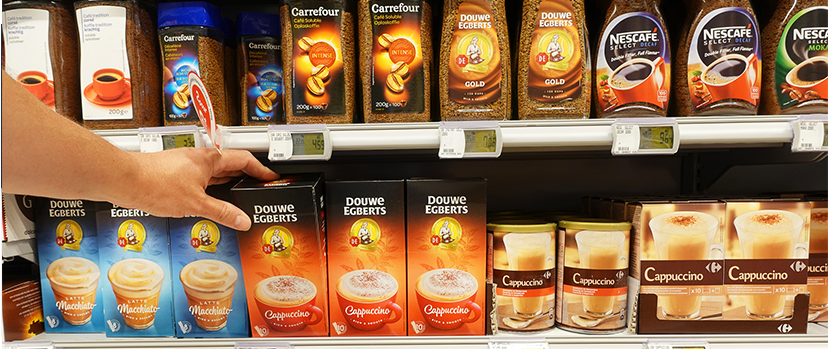If you ever wonder about the viability of creating a private label of products as a business strategy, this may be the perfect opportunity to learn about it.
Through this post, you’ll gain the most fundamental concepts involving private labeling, how they work (or how they may not work), and how you can start creating your own private label products to grow or start your business.
What’s a Private Label?
Simply put, private label brands (or store-owned brands) are products sold by a single retailer bearing its own brand’s packaging and labeling but sourced from a third-party manufacturer. In effect, these supermarkets can influence the branding of the product to assimilate with that of their own.
Although many consumers today are unaware of the concept of private labeling, this is actually quite common practice for retail companies and manufacturers. So much so they’ve developed long-standing impressions and varying perspectives as to its effectiveness as a business strategy.
White Label
There’s a very subtle distinction between a private label and a white label product.
While a private label product is exclusive to a single retailer, a white label product is a generic item sold by many retail companies. These retailers simply take a product and rebrand it according to their preference.
In effect, there’s no difference in the quality of the products sold by each retail company. However, they will vary in each product’s branding.
Popular Examples
To better understand private label products, let’s discuss a few quite popular ones found in the market today.
Tesco Value
In 1993, Tesco, a multinational grocery and general merchandise retailer based in the UK became one of the first supermarkets to launch its value range, bearing a blue-and-white striped branding and introducing consumers to ‘down to earth’ food options.
Tesco lost quite a lot from this private label series as these products were extremely low-priced and the packaging was so dismal that it discouraged consumers from relying on its quality.
In 2012, Tesco launched a healthier and better tasting version through the ‘Everyday Value’ label, which promised far better quality than the Tesco Value series. This introduced a more colorful and softer brand packaging to reverse its previously poor performance.

AmazonBasics
Amazon’s most popular private label product, Amazon Basics offers a wide variety of products including essential home goods like kitchen, home improvement, and pet products, office supplies, and electronic accessories.
They also have the Amazon Collection, which offers a wide selection of jewelry, including affordable earrings and charm bracelets, expensive engagement rings, and even wedding pieces. Their most popular item is a pair of lab-created diamond stud earrings.
Macy’s Inc.
Macy’s Inc. owns several private labels including Alfani, Bar III, Charter Club, and Club Room. There are many other merchandises available only at Macy’s each designed to fit a niche within the apparel industry.
Young professionals who are just getting accustomed to workplace wardrobe or corporate executives who prefer donning timeless and well-curated pieces to their workplace can find quality clothing in Macy’s line of private label products.

Benefits to Retailers
In a survey published by Statista in Sep 2020 comparing consumer behavior between 2014 and 2019, 40% of respondents were more inclined to purchase store-owned brands over name brands and were even willing to pay more for it, providing they like the store product.
This just reaffirms that private labels are continuously gaining traction and heaping chunks of the market share in the retail industry.

Influencing the Bottom Line
If you’re running a business, consistently improving the bottom line will naturally be the topmost consideration for you and your stakeholders.
- Control over Inventory and Production
Manufacturers will produce volumes of products at the order of their retail partners, so the company has complete control over the quantity of their inventory, and even the product ingredients and quality.
- Control over Pricing and Profit Margins
Own brand labels have the advantage of not needing any advertising campaigns to make them sell. For this reason, retailers can afford to sell at much lower prices than their branded counterparts sitting on the next shelf.
On average, stores will typically price their own labels around 30% lower than national brands, positively contributing to profit margins.
Impact on Customer’s Perception
Store labels are slowly but surely ensuring they move away from their previously poor reputation. When, in the past, the public would perceive private label products as second-class alternatives, consistently delivering high-quality products has effectively enabled them to compete with the standards set by national brands
- Exclusivity and Branding
As a store-owned brand, retailers have the exclusive right to act as suppliers to private-label goods. This exclusivity creates more value in how consumers perceive the products as owning them becomes such a novelty or rarity.

If you add excellent marketing to the mix, demand for items, which only you can provide to the market, will increase, contributing positively to your margins.
Store brands also have full control of how these products look. Some brands have even tried mimicking high-end name brands to influence sales more. But, as in Tesco’s example, branding can impact the performance of a line of products, so it’s vital to strategize on this aspect.
- Adaptability
Meeting sudden demands or shifts in customer behavior is more agile, as a retail company can simply inform its partner to adjust production volumes or tweak specific manufacturing processes.
Drawbacks
Although there are drawbacks, these are all manageable as long as retail companies conduct proper planning and allocate funds to minimize avoidable concerns.
Manufacturing Limitations
Since production falls at the hands of third-party manufacturers, it’s essential to partner with reputable and well-established private label manufacturers to prevent issues ill-prepared sources will inevitably be unfit to handle.
- Minimum Orders
Most private label manufacturers will require minimum orders before they can sign an agreement with you to partner with them. Here is where funds and preparedness come in handy, as in most cases, minimum order quantities will be much larger than what you would want to start off with.

Dead Inventory
Before entering into any arrangement with product sources, retailers need to ensure they conduct proper market studies to identify which products they want to provide and which market segment they want to serve.
Otherwise, they may end up ordering products that don’t appeal to the market, leaving them with unsold or dead inventory.
Negative Conotation
Private labeling in the past was typically geared towards providing cheaper options instead of delivering quality goods. For this reason, customer perception of these products declined, and their trust in well-established brands continued to stay firm.
It’s crucial, therefore, to conduct an in-depth analysis of your customers, especially their behavior and preferences.
Difficult to Build Brand Loyalty
Own store brands sit beside name brands in supermarket aisles, and as you can imagine, it can be hard for these products to compete against well-established and highly marketed national brands that have already staked their claim in a piece of the market for decades.
Add to this the fact that consumers will have limited access to private label products as they will only be available at your supermarkets alone, whereas national brands are obtainable everywhere. But this can also be beneficial for promoting exclusivity, which adds value to the products.
Process of Private Labelling
Private labeling is a sustainable business model that may just be your ticket to getting the income you’ve always wanted. If you’re interested in starting on this path, be sure to follow these steps to ensure your success.
1. Carry out an in-depth product and market research.
Performing an analysis of the specific and required qualities of the product you want to offer should be paramount on your list.
You should also conduct a comprehensive study of the market segment you would like to serve, as this will allow you to set your buyers’ personas and match your products for them.
It will help you understand your consumers’ needs and expectations, allowing you to tailor your products to those needs.
You can learn how to conduct proper market research in this post.
2. Select a reputable and well-established product source.
Once you know what products to sell and which segment of the market you want to offer it to, it’s time to find the most suitable manufacturer to become your partner. Most get stuck in this stage as there are so many ways you can do this, and without help, you may find yourself settling for the wrong supplier, or worse, get stuck with an unreliable one.
Consider these questions when selecting the right third-party manufacturer to work with.
- Do they offer the best pricing available at this time?
- Do they have a reputation for providing reliable service?
- Do they have quality assurance standards set in place within their manufacturing process?
For a more in-depth discussion on the steps involved in selecting the right product manufacturer for you, click this link.
3. Create a remarkable brand.

This is an important step, as making a good first impression on your customers will ensure they keep coming back to you.
Branding includes not only your logo and brand name or tagline, but it also encompasses your website and Amazon listing, the labels placed on your products and how they’re packaged individually, and how they look when they arrive at your customers’ doorsteps.
All these elements make up the entire buying experience and are what will make or break your brand’s reputation. For this reason, it’s crucial to create as seamless a flow and presentation as possible so you create positive and rewarding experiences for your consumers.
4. Establish your business’ entity.
If you haven’t already, you must set your business up legally. As a business owner, you must register your company to the Secretary of State. Then, depending on the products you want to sell, you may also need to register for a Trademark or patent to secure your brand.
To make your reach wider, you may also want to consider launching a website and register with local tax authorities. If you’re thinking of using Amazon as a platform in selling your products, you must set up a Sellers’ Central account as well to sell there.
5. Optimize your Amazon listings.
Amazon will open up opportunities for your business’ exponential growth if you use it properly, and one way to take advantage of what it offers sellers like you is to make sure you maximize the use of each of your listings to meet consumer preferences.
Make sure you upload five to six quality and visually attractive images of your products per listing. A high-resolution image will typically be around 1500 x 1500 pixels.
Your product titles should appeal to your purchasers as well, and it should succinctly describe your product’s specifications. Make sure you use enough keywords throughout your listing so they appear in popular search queries within the platform.
Will Private Labelling Contribute to Your Business Growth?
We really can’t deny the appeal of private label brands, both to retailers and manufacturers. It will undoubtedly give you the opportunity to create an income stream that can last a lifetime if you do it the right way.
Like any business venture, you can create success through unwavering perseverance, almost all-knowing patience, discipline, and the capacity to learn continuously and grow your mindset as you traverse this exciting journey you’re about to embark on.
Still can’t decide?
Read this article to learn how vital corporate branding is in influencing buyers’ opinions of your product.
Read This Post
Share on facebook
Facebook
Share on twitter
Twitter
Share on reddit
Reddit
Share on linkedin
LinkedIn
Share on email
Email







Want to start a virtual fundraiser, but don't know where to begin? Checkout Cheddar Up 🧀👆 for guidance, solutions and create a FREE fundraising page at no cost to your organization. 👏🤯🧀🧀💲💸💰 #customlogocase #CustomLogo #deviceprotection #laptopbag #chromebookcase #computersleeve #ptafundraiser #PTAfundraisers #schoolfundraiser #fundraiser #ptofundraising #fundraising #customcomputerbag #CustomLaptopSleeves #chromebooksintheclassroom #customcomputercase #customchromebooksleeve #CustomLaptopcover #customchromebookcase #PTA #PTO #ipadcases #macbookcases #fundraise ... See MoreSee Less
Online Fundraising in 3 Easy Steps + Example
www.cheddarup.com
How to create an online fundraising page in 3 simple steps with an example to get you started! Collect open, fixed, and recurring donations.Our cases are completely customizable to include case and sleeve orientation. Vertical or Horizontal Cases and Sleeves available. A vertical orientation allows for device ease of access in backpacks and charging or docking stations. Check us out today! #verticalcases #computersleeve #CustomLogo #laptopbag #customlogocase #chromebookcase #deviceprotection ... See MoreSee Less
Learn More
Happy Mother's Day from Custom Logo Cases! 😍🥰🥳🤱🤰🌹🌺🌸🌼💐🌟☀️🍾
#Mothersday2024 #momlove #computersleeve #CustomLogo #laptopbag #chromebookcase #deviceprotection #customlogocase ... See MoreSee Less